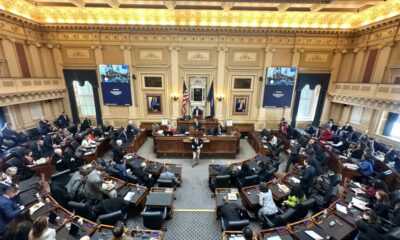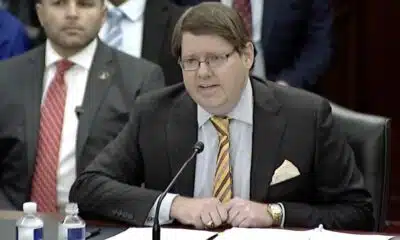Arkansas attempted to become the first state in the nation to ban pharmacy benefit managers (PBMs) from owning or operating pharmacies. Instead, it became the first to be blocked by a federal judge for violating the Constitution – and for good reason. This kind of regulatory capture undermines the moral authority behind the legislation, and the court was justified in intervening.
On July 28, U.S. District Judge Brian Miller issued a preliminary injunction halting the Arkansas law, which was set to take effect August 5. He ruled that the ban “appears to overtly discriminate against plaintiffs as out-of-state companies,” and that the state “failed to show that it has no other means to advance its interests.”
In short, the law was not only anti-competitive but also unconstitutional.
The ban, signed earlier this year by Gov. Sarah Huckabee Sanders, would have forced companies like CVS and Express Scripts to shut down pharmacies across the state. CVS alone projected it would need to close all 23 of its Arkansas locations – eliminating nearly 500 jobs and reducing access to prescriptions, especially in rural areas where pharmacy options are already limited.
This is a policy failure masquerading as populist rhetoric. Banning PBMs may seem politically popular, with similar legislation being filed at both the federal and state levels, but it’s terrible economics and even worse health policy. Other states, including Louisiana and Tennessee, should take note – and reconsider their actions before causing further harm.
Congress should pay attention, too. Several lawmakers are proposing national legislation to ban PBMs from owning pharmacies. That would magnify the damage across all 50 states, stifle innovation, and further entrench government distortion in an already broken system.
Arkansas isn’t the only example of this approach failing in court. Just days earlier, a federal judge in Iowa issued a preliminary injunction against several new PBM regulations, including restrictions on pharmacy networks and reimbursement requirements. The court found that Iowa’s law likely violates the Constitution’s Supremacy Clause and ERISA, reinforcing that these state-level PBM crackdowns aren’t just bad policy – they’re legally suspect and increasingly falling apart in federal court.
Yet lawmakers keep pushing them, hoping to look like they’re “doing something” about high drug prices while avoiding the real structural issues driving costs higher.
Let’s start with the facts: PBMs didn’t break the healthcare system. They are a response to a system that has long been broken by government interference. For nearly a century, federal and state policies have layered on price controls, tax distortions, and third-party payer models that disconnect patients from prices and providers from the outcomes of their care. With Medicare and Medicaid dominating reimbursement, and employer-based coverage distorted by the tax code, market signals are barely present.
As we argue in “Empower Patients: Two Doctors’ Cure for Healthcare,” co-authored with Dr. Deane Waldman, America’s healthcare crisis stems from the third-party payer system. The overwhelming majority of healthcare dollars flow not from patients, but from insurers and government programs. Until we reconnect patients with prices through tools like Health Savings Accounts, Direct Primary Care, and regulatory reform – costs will continue to rise and access will remain limited.
That’s where PBMs come in.
PBMs emerged to negotiate drug prices, promote the use of generics, and manage pharmacy benefit plans in a system already warped by public policy. In a true free market, PBMs might not be needed. But in today’s environment, they serve as one of the few checks on cost escalation – even if imperfectly.
Arkansas didn’t just misunderstand this dynamic, it ignored it. Even worse, lawmakers carved out an exemption for employer-only pharmacies, conveniently shielding Arkansas-based Walmart from the law’s impact. If this were truly about fairness or access, there would be no need to pick winners. That’s not policy, it’s protectionism.
Supporters argue that PBMs are driving independent pharmacies out of business. But that blame is misplaced. The real culprits are shrinking margins from Medicare and Medicaid reimbursements, costly federal mandates, and a lack of transparent, direct-to-consumer competition. Targeting PBMs is politically easy but economically backwards.
Banning PBMs won’t fix the system. It will make it worse.
Had the Arkansas law taken effect, it would have closed pharmacies, disrupted care, eliminated jobs, and reduced competition. Vertical integration between PBMs and pharmacies can improve coordination, reduce friction, and cut costs – benefits that disappear when politicians force companies to break apart.
Real reform means restoring competition, not banning it. That means cutting FDA approval times for generics and biosimilars. It means replacing outdated Medicare and Medicaid formulas that reward spending over results. It means decentralizing healthcare power from Washington back to the states – and ultimately, back to patients and their doctors.
Gov. Sanders and other state leaders deserve credit for wanting to fix what’s broken. But this isn’t the way. The Arkansas PBM ban – and similar efforts in Iowa and elsewhere – would fail patients, fail pharmacies, and fail the free market. Thankfully, the Constitution did its job. Now policymakers need to do theirs – by rejecting bans and embracing competition.











































